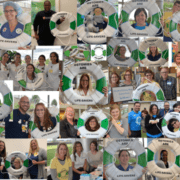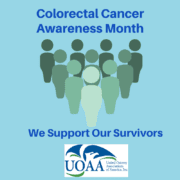When to Contact Your Stoma Care Nurse
Your stoma care nurse has the specialized training to help you care for your ostomy and address any issues that arise. These professionals are also known as “WOC” (wound, ostomy, and continence) nurses. Stoma care nurses are there to help you make a smooth transition after surgery, and can give you the training you need to care for your ostomy at home. You should consider them your “go-to” resource for ostomy care education, consultation, and troubleshooting.
In honor of WOC Nurse Week, celebrated every year in mid-April, it is important to recognize the ongoing role that stoma care nurses can play in your ostomy care.
When to Contact Your Stoma Care Nurse
Not every ostomy care challenge warrants contacting your stoma care nurse, but certain issues are causes for concern and should be assessed by a trained professional. Connect with your stoma care nurse if you notice any of the following problems.
If you have a colostomy or ileostomy, call your ostomy care nurse if you notice:
- Skin irritation
- Recurrent leaks under your pouching system or skin barrier
- Excessive bleeding of your stoma
- Blood in your stool
- A bulge in the skin around your stoma
- Persistent diarrhea
- Diarrhea with pain and/or vomiting
- A stoma that appears to be getting longer
If you have a urostomy, call your ostomy care nurse if you notice:
- Any sign of urinary tract infection
- Skin irritation
- Urine crystals on or around your stoma
- Recurrent leaks under your pouching system or skin barrier
- Warty, discolored skin around your stoma
- Excessive bleeding of your stoma
- Blood in your urine
- A bulge in the skin around your stoma
- A stoma that appears to be getting longer
Finding a Stoma Care Nurse and Showing Your Support
If you do not have a stoma care nurse, you can search to Find a Nurse using your state or zip code on the WOCN Society website. This feature is also accessible by clicking the “Resources” icon in the Peristomal Skin Assessment Guide for Consumers, a free, easy-to-use, digital tool designed to help teens and adults living with an ostomy identify common skin problems, provide next steps for care or management, and prompt when it is appropriate to seek support from a WOC nurse.
How Hollister Secure Start Services Can Help
Hollister Secure Start services offer free customized ostomy support for as long as you need it, regardless of the brand of products you use, including help using the Peristomal Skin Assessment Guide for Consumers. Call us at 1.888.808.7456.
Incredible WOC nurses make a daily impact in the lives of people living with an ostomy. Show your support for all they do during WOC Nurse Week (April 14-20, 2019) by sharing a story or photo on social media using the hashtag #WOClove.
The Peristomal Skin Assessment Guide for Consumers was funded through an educational grant from Hollister Incorporated.
The information provided herein is not medical advice and is not intended to substitute for the advice of your personal physician or other healthcare provider. This information should not be used to seek help in a medical emergency. If you experience a medical emergency, seek medical treatment in person immediately.
Editor’s note: This educational article is from one of our digital sponsors, Hollister Incorporated. Sponsor support along with donations from readers like you help to maintain our website and the free trusted resources of UOAA, a 501(c)(3) nonprofit organization.












Trackbacks & Pingbacks
[…] require marking the abdomen for placement of the stoma (opening.) That is typically done by the Wound, Ostomy, and Continence Nurse (WOCN) and that is the person who comes to the patient’s room post-op to begin to prepare the ostomate […]
Leave a Reply
Want to join the discussion?Feel free to contribute!